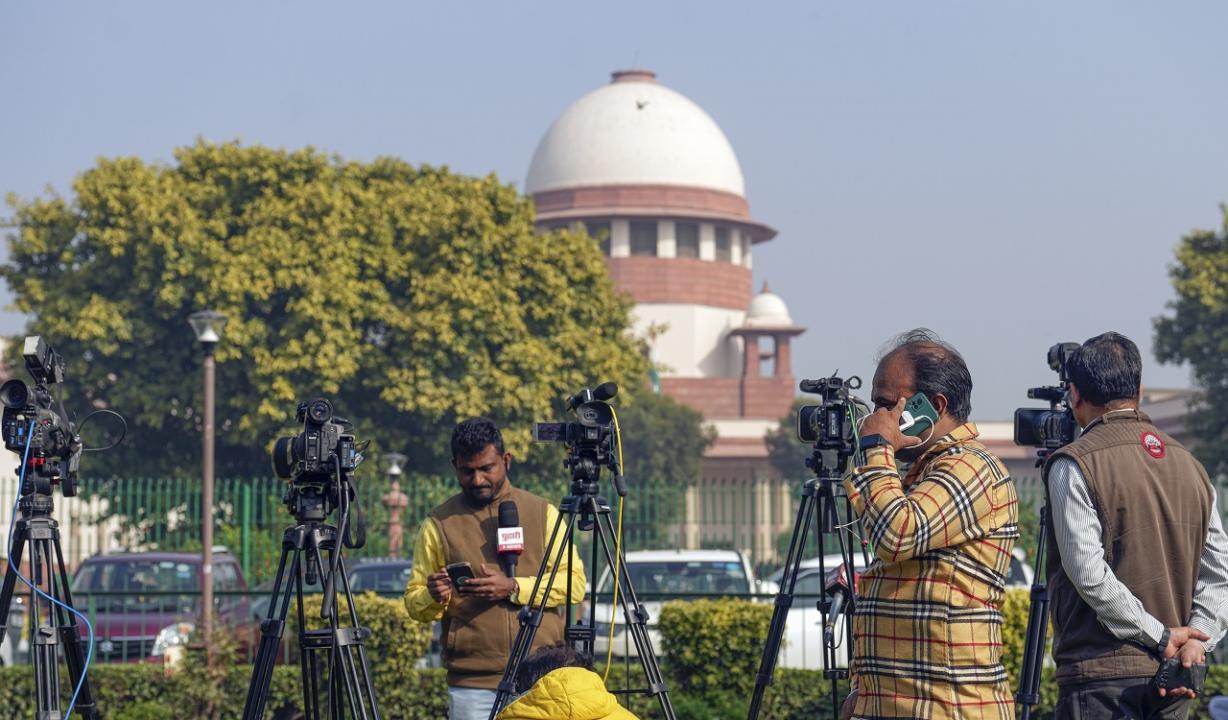A five-judge Constitution bench comprising Chief Justice of India DY Chandrachud, Justices Sanjay Kishan Kaul, Sanjiv Khanna, BR Gavai, and Surya Kant delivered the verdict

Pic/PTI
Key Highlights
- The Supreme Court upheld the Union Government`s decision to abrogate Article 370
- Apex court also directed that statehood to Jammu and Kashmir be restored at earliest
- Erstwhile state does not have internal sovereignty different from other states, CJI said
The Supreme Court on Monday upheld the Union Government's decision to abrogate Article 370 of the constitution which gave special status to Jammu and Kashmir and said that every decision taken by the Centre on behalf of a State can't be subject to a legal challenge.
ADVERTISEMENT
A five-judge Constitution bench comprising Chief Justice of India DY Chandrachud, Justices Sanjay Kishan Kaul, Sanjiv Khanna, BR Gavai, and Surya Kant delivered the verdict.
The apex court also directed that statehood to the union territory of Jammu and Kashmir be restored at the earliest.
Writing the judgement for himself and Justices Gavai and Surya Kant, Chief Justice of India D Y Chandrachud said Article 370 of the Constitution was a temporary provision and the president has the power to revoke it.
The apex court also upheld the validity of the decision to carve out the union territory of Ladakh from Jammu and Kashmir on August 5, 2019. On that day, the government abrogated Article 370 and bifurcated the state into two union territories -- Jammu and Kashmir, and Ladakh.
The erstwhile state does not have internal sovereignty different from other states of the country, the CJI said.
The Constitution Bench was hearing a batch of petitions challenging the abrogation of Article 370 of the Constitution and bifurcating the state into two Union Territories.
Also Read: Mehbooba Mufti put under 'house arrest' ahead of SC verdict on Article 370
Here are the key points of the Supreme Court's verdict:
- Can't be subject to a legal challenge: CJI Chandrachud reading out the judgement said that every decision taken by the Centre on behalf of a State under proclamation can't be subject to a legal challenge and it will lead to the administration of the State to a standstill.
- Article 370 temporary provision: Supreme Court said that it has held that Article 370 was a temporary provision. "The proclamation of Maharaja stated that the Constitution of India will supersede. With this, the para of Instrument of Accession ceases to exist....Article 370 was an interim arrangement due to war conditions in the State. Textual reading also indicates that Article 370 is a temporary provision," the Court said.
- Presidential rule: The Apex court also mentioned that the argument of petitioners that the Union government cannot take actions of irreversible consequences in the State during Presidential rule is not acceptable. "We have held that the state of Jammu and Kashmir did not retain an element of sovereignty when it joined the Union of India. We have arrived at this conclusion for the following reasons. First paragraph eight of the instrument of acession executed by Maharaja Hari Singh provided that nothing in the instrument would affect the continuance of the sovereignty of the Maharaja in and over the state," CJI Chandrachud said.
- Full and final surrender of sovereignty: The CJI further noted that on November 25, 1949, a proclamation was issued for the State of Jammu and Kashmir by "Yuvraj Karan Singh". "The declaration on this proclamation, that the Constitution of India would not only supersede all other constitutional provisions in the state, which were inconsistent with it, but also abrogate them, achieves what could have been attained by an agreement of merger. With the issuance of the proclamation, paragraph of the instrument of acession ceases to be of legal consequence. The proclamation reflects the full and final surrender of sovereignty by Jammu and Kashmir through its sovereign ruler to India " CJI added further.
- Assembly elections and statehood: The Supreme Court said "The declaration issued by the President exercises the power and clause 3 of Article 370 is a culmination of the process of integration. Thus, we do not find that the President's exercise of power under Clause 3 of Article 370 was malafide. We hold the exercise of Presidential Power to be valid." The apex court also noted that Article 370 was meant for the constitutional integration of Jammu and Kashmir with the Union and it was not for disintegration and the President can declare that Article 370 ceases to exist. "Concurrence of the State government was not required to apply all provisions of the Constitution using Article 370(1)(d). So, the President of India taking the concurrence of the Union government was not malafide," the Court noted. The Supreme Court also directed the Election Commission to hold Jammu and Kashmir Assembly elections by September 30, 2024. The Supreme Court said in view of Centre's submission on restoration of statehood of Jammu and Kashmir, it directs that statehood shall be restored as soon as possible.
(With inputs from Agencies)
 Subscribe today by clicking the link and stay updated with the latest news!" Click here!
Subscribe today by clicking the link and stay updated with the latest news!" Click here!








